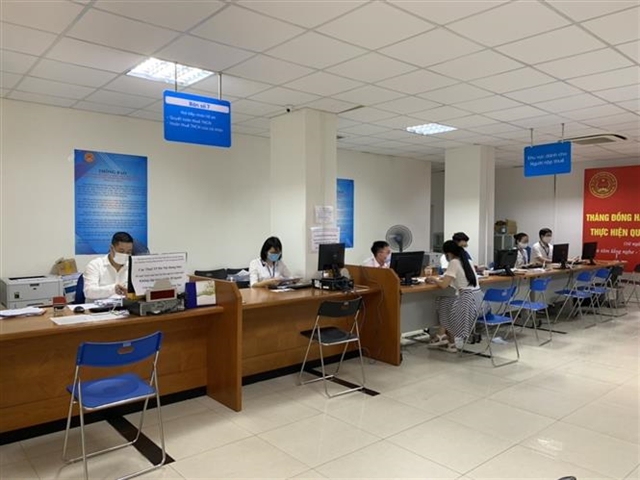 Economy
Economy


|
| Inside an office of the Hanoi Tax Department. — VNA/VNS Photo |
HÀ NỘI — The Personal Income Tax Law will be revised in 2025, following the proposed timeline submitted to the Government and reported to the National Assembly (NA) Standing Committee.
Minister of Finance Hồ Đức Phớc said that the ministry was currently conducting a review and assessment of tax laws, including the Personal Income Tax Law. It was anticipated that the report would be submitted to the NA for feedback in October 2025 and approval in May 2026.
Under the existing provisions of the Personal Income Tax Law, individuals are obligated to pay personal income tax on earnings from salaries and wages. Taxable income is the amount after deducting tax-exempt items, such as social insurance, health insurance and unemployment insurance.
Individuals are required to pay taxes in accordance with the regulations only if they generate taxable income.
The Personal Income Tax Law, effective from January 1, 2009, stipulates a monthly deduction of VNĐ4 million (US$157.2), or VNĐ48 million per year, for taxpayers, as well as a deduction of VNĐ1.6 million per month for each dependent.
The revised Law on Personal Income Tax No. 26/2012/QH13, effective from July 1, 2013, states that the deduction amount for taxpayers is VNĐ9 million per month, or VNĐ108 million per year, while the deduction for each dependent is VNĐ3.6 million per month.
On June 2, 2020, the NA Standing Committee issued Resolution No. 954/2020/UBTVQH14, which adjusted the family circumstance deductions for personal income tax (effective from the 2020 tax year). As per the resolution, the deduction for taxpayers increased to VNĐ11 million per month, or VNĐ132 million per year, and the deduction for each dependent amounted to VNĐ4.4 million per month.
Economists emphasise the significant role of implementing personal income tax policies in redistributing resources according to the different stages of economic and social development.
In addition to other revenue sources, personal income tax contributes to the state budget, supporting various needs such as investment, national security, social welfare and poverty reduction.
However, there are concerns that the current family circumstance deduction amount is no longer suitable given the actual cost of living. Relying solely on consumer price index (CPI) fluctuations to determine the deduction is considered inadequate. Hence, it should also consider the evolving consumer needs of the population.
According to Associate Professor Dr. Đinh Trọng Thịnh of the Academy of Finance, adjusting the family circumstance deduction amount only when inflation changes by 20 per cent is overly rigid. Tax policies should not be solely linked to inflation since people's living standards improve each year.
Instead, policymakers need to adopt a new mindset and create appropriate tax policies that incentivise labour creativity.
Associate Professor Dr. Phạm Thế Anh, Head of the Economics Department at the National Economics University, said that the current family circumstance deduction level was too low and no longer aligned with reality.
Over the past decade, the cost of living, especially in major cities, had risen significantly. In contrast, the taxable income threshold had only risen by VNĐ2 million to VNĐ11 million, representing a 20 per cent increase that does not adequately match the CPI.
According to the Ministry of Finance, the Law on Personal Income Tax states that adjustments to family circumstance deductions will be proposed if the consumer price index fluctuates by 20 per cent. However, since the change has not reached this threshold, the ministry will continue monitoring it for future adjustments.
The comprehensive review of tax laws, including the amendment to the Law on Personal Income Tax, is scheduled for 2025 as previously reported to the Government and the NA Standing Committee. — VNS




